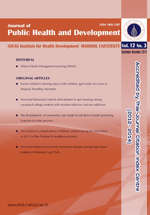Stakeholder’s Narrative Experiences in Methamphetamine Rehabilitation: A Case Study of the FAST-Model
Main Article Content
Abstract
Methamphetamine is the most commonly abused drug in Thailand. The FAST model for rehabilitation had
been implemented for decades. In this research, the benefits and limitations of using the FAST model were
investigated for future development. A qualitative approach was used as the main tool for data collection.
The key informants were selected based on purposive sampling, which consisted of health professionels
(n=13), patients (n=10), and their family members (N=9). Focus Group Discussions and in-depth interviews
were conducted at a drug addiction treatment Center in , Pathum Thani. Content analysis was used for
data conclusion. The findings indicated that the FAST model gave direct benefit to the patient. Due to the
FAST model is a great teamwork, great process of learning, humanizing, and successful changes in patient
behavior. Limitations in the FAST model relied on lack of patients’ needs assessment and health screening,
limiting personal resources and skills, lack of family participation, and human rights.
From this narrative study, the two domains for development are suggested include (1) patient-family
management to in achieve success in the rehabilitation process (2) medical services improvement for health care provider and multidisciplinary teams.


